Desert storms: The women who turned aid money into business empires

From left: Saddia Hussein, Zainab Abdikarim and Fathiya Hussein in this photos taken on October 11, 2024, in Wajir County. Their business success has revolutionised family dynamics, as women transition from dependent housewives to respected business owners.
What you need to know:
- From receiving a meager Sh2,500 monthly stipend that barely provided one meal a day for her children, a group of women in Wajir County have transformed into successful entrepreneurs through a program, which provided each group with a Sh90,000 grant.
- Using an innovative three-padlock savings system and sheer determination, these former aid recipients now earn up to Sh2,200 daily from their market stalls and furniture shops.
- Their success has not only revolutionised family dynamics in this arid region but also significantly reduced gender-based violence, as women transition from dependent housewives to respected business owners.
The morning air is still crisp at 5am in Halane II village, Wajir County, when Saddia Hussein rises from her bed. After saying her morning prayers, she wraps herself in a colourful shawl and heads out into the breaking dawn – a journey that would have seemed impossible just months ago.
"I used to only wake up to prepare breakfast and send my children to school, then sit at home waiting for my husband's return every evening," she recalls, arranging fresh tomatoes at her bustling market stall.
Today, the vegetables gleam under the morning sun as customers queue for their daily supplies. Her eyes sparkle with pride as she tends to them, a testament to her transformation from a dependent housewife to a thriving businesswoman.
Saddia's metamorphosis began last July when her group – The Quran business group – received funding through a UK-Kenya government collaboration called the Kuza Jamii program. Previously, she belonged to Group Two of the Hunger Safety Net Program (HSNP), receiving a monthly stipend of Sh2,500 as part of Group Two of the HSNP program. Every shilling of that money would go toward securing just one meal a day for her two young children in the lower grades of primary school. Under the original program, the most vulnerable families in Group One received Sh5,000 monthly, while those in Group Two, like Saddia, received half that amount.
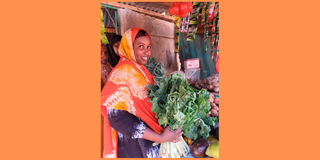
Saddia Hussein displays her wares at her vegetable shop at Halane 1 village in Wajir on October 11, 2024. She is among the beneficiaries of the Kuza Jamii grants to the vulnerable in the semi-arid Wajir County.
Now, standing at her well-stocked stall surrounded by pyramids of onions, tomatoes, and fresh fruits, she beams as she explains how her life has changed. Together with her two group members, they make an impressive Sh2,200 in profits per day.
"We share the profits equally among ourselves," she explains, gesturing to include her business partners, "and always set aside some for savings. Just last week, one of us needed Sh5,000 for her child's school fees, and we managed it from our group savings."
Their success is part of a larger transformation happening across Wajir. Saddia's group is among 430 business groups that received a Sh90,000 grant through the Kuza Jamii Program. As British Deputy High Commissioner and Development Director Leigh Stubblefield notes, "Women are now empowered to run businesses, meaning they have financial independence and families have more money to escape poverty."
The transformation extends beyond mere numbers. Where once she struggled to provide a single meal for her children, Saddia now walks with the confidence of someone who has taken control of her destiny. Her stall, one of many in the bustling market of Halane II, represents more than just a business – it's a symbol of hope and resilience.
In the neighbouring stall, an unexpected figure adds diversity to this women-led transformation. Sheikh Abdi, the only male participant among 105 beneficiaries in Wagbere Ward, brings warmth and good cheer to the market despite his physical challenges. Unable to make the daily market runs due to his impairment, he has found his niche as the group's bookkeeper, meticulously updating their business records while sharing jokes with passing customers. His journey to this moment is equally compelling.
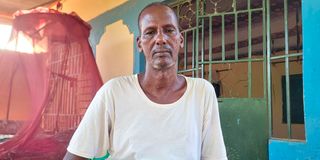
Sheikh Abdi, the only male member among the 90 participants in the 30 business groups at Wagbere Ward, Wajir on October 11, 2024.
"I lost everything," he says, his characteristic good humour intact despite the memory of watching his livestock succumb to the previous year's devastating drought, followed by floods that destroyed his crops.
"But now, I feel like a man again. I can provide for my family through this business, and my wife runs her own business in another group. Together, we're building something new."
A few kilometres away in Halane I village, another story of transformation unfolds in a modest home where seven business groups have gathered. They form part of a Village Savings and Loan Association (VSLA), an initiative that has revolutionised how these communities handle money.
Each member contributes Sh600 monthly to create a pool of funds for lending within the community. Their innovative banking system consists of a metallic box with three padlocks, its keys held by different members living in separate villages.
We find Nunay Hassan, who mentors more than 30 business groups in Wagbere Ward, presiding over this gathering with quiet authority.
"For one to be allowed to keep the money, their house must be identified as the safest place," she explains.
"And importantly, the money keeper doesn't have any of the three keys that open the box." The box can only be opened during meetings when all members are present, creating a robust system of checks and balances.
Nunay also reveals how the Kuza Jamii Program structured its support to ensure sustainability.
"At the start, each group received Sh60,000, with the balance of Sh30,000 coming a few months into the business," she explains. "This phased approach helped groups prove their commitment and business acumen."
Dr Lynnet Ochuma, the Economic Inclusion Coordinator in the Social Protection State Department, sees this kind of structured support as crucial.
"We have enhanced services to develop a social registry for vulnerable households," she explains, "and initiated cash plus programs that aim at graduating the ultra-poor from extreme poverty."
Nunay watches over the gathering with quiet satisfaction.
Also read: Chamas putting a big smile on women’s faces
"The women no longer sit at home," she observes. "Every morning, you'll find them in the market getting their products for sale. They divide their profits and reinvest to expand their businesses. Since the inception of the program, we've seen remarkable changes in how women approach their daily lives."
In the neighbouring Borawako Ward, the Gedow business group tells yet another story of resilience.
Zainab Abdikarim, one of its three members, no longer struggles to buy school materials with her HSNP stipend. Their furniture business, supplemented by detergent production and children's toys, has transformed her from a worried mother into a confident provider.
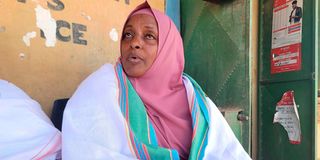
Zainab Abdikarim, a member of the Gedow business group speaking at their business premises at Borawako Ward, Wajir County on October 11, 2024.
"The seed capital we got has enabled us to start this business that is doing well," Zainab says, her voice filled with pride. "I have sent my last child to a private school, and the school fee is now affordable because I have cash in my hands."
Her business partner, Abdirahman Ali, shares his own renaissance story. "I never knew I would ever get back to carpentry," he says, his weathered hands running over a newly finished piece of furniture. "I trained as a carpenter in 1981 but was forced out of business in 2014. I have been surviving on menial jobs, but this boost is a life changer."
Their mentor, 28-year-old Fathiya Hussein, known affectionately as 'Mwalimu', represents a new generation of change-makers. She exemplifies the shifting dynamics in these traditionally patriarchal communities – her husband stays home with their baby when he visits, encouraging her work in poverty eradication.
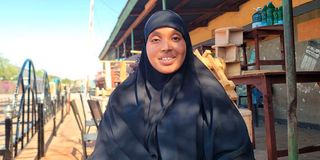
Fathiya Hussein, at Gedow Business premises at Borawako, Wajir. She is the mentor of 35 business groups.
The impact of these changes reaches far beyond individual households. According to the Kenya National Bureau of Statistics' 2024 report on "Inequalities in wellbeing in Kenya," regions like Wajir have historically faced significant challenges with poverty and deprivation. But through initiatives like Kuza Jamii, which has reached 1,290 participants across 430 business groups in Wajir alone, the landscape is gradually changing.
For Irene Rose, Senior Technical Director at Boma, the Nairobi-based NGO implementing the project across eight counties, the program's success lies in its comprehensive approach. "Conflict, particularly gender-based violence, has greatly reduced," she notes. "Women would just sit at home and wait for their husbands who would sometimes come back with nothing and unleash their stress through violence. Now, children who previously had only one meal can focus more in school because their parents afford more than two meals a day."
The program's reach extends across Garissa, Samburu, Mandera, Isiolo, Turkana, Tana River, Marsabit and Wajir, serving some 9,354 participants. But beyond these numbers are stories of real change and transformation.
Dr Ochuma sees this as part of a broader strategy. "We have enhanced services to develop a social registry which is a depository database for all vulnerable households," she explains.
"We have initiated cash plus programs such as the economic inclusion program that aim at graduating the ultra-poor from extreme poverty."
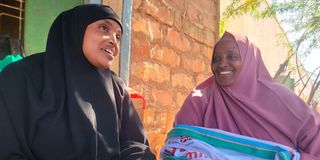
Fathiya Hussein (left) and Zainab Abdikarim at Gedow business premises at Borawako Ward, Wajir County on October 11, 2024.
British Deputy High Commissioner and Development Director, Leigh Stubblefield, emphasises the broader implications of this economic empowerment: "Women are now empowered to run businesses, meaning they have financial independence and families have more money to escape poverty. We can only go far, together, and this is what underscores our Kuza Jamii partnership with the Kenyan Government which aims to empower vulnerable populations and alleviate poverty."
As evening sets over Wajir, Saddia counts her day's earnings, her face glowing with satisfaction. The stall that once seemed an impossible dream now stands as a testament to what's possible when women are given the opportunity to thrive. Tomorrow, she'll rise again at dawn, not out of obligation, but with the dignity of a woman who has found her place in the marketplace – and in society.
Around her, in the markets and villages of Wajir, hundreds of women like her are writing new chapters in their lives, one business day at a time. Their stories echo through the dusty streets and busy marketplaces, inspiring others to imagine different possibilities for themselves and their families. For these women, the future is no longer something that happens to them – it's something they're actively creating, one small business at a time.
“Extreme poverty is a major obstacle to prosperity. We are working with Kenya, in line with the UN Sustainable Development Goal of eradicating extreme poverty, to tackle the causes of poverty in Kenya,” Leigh says.

